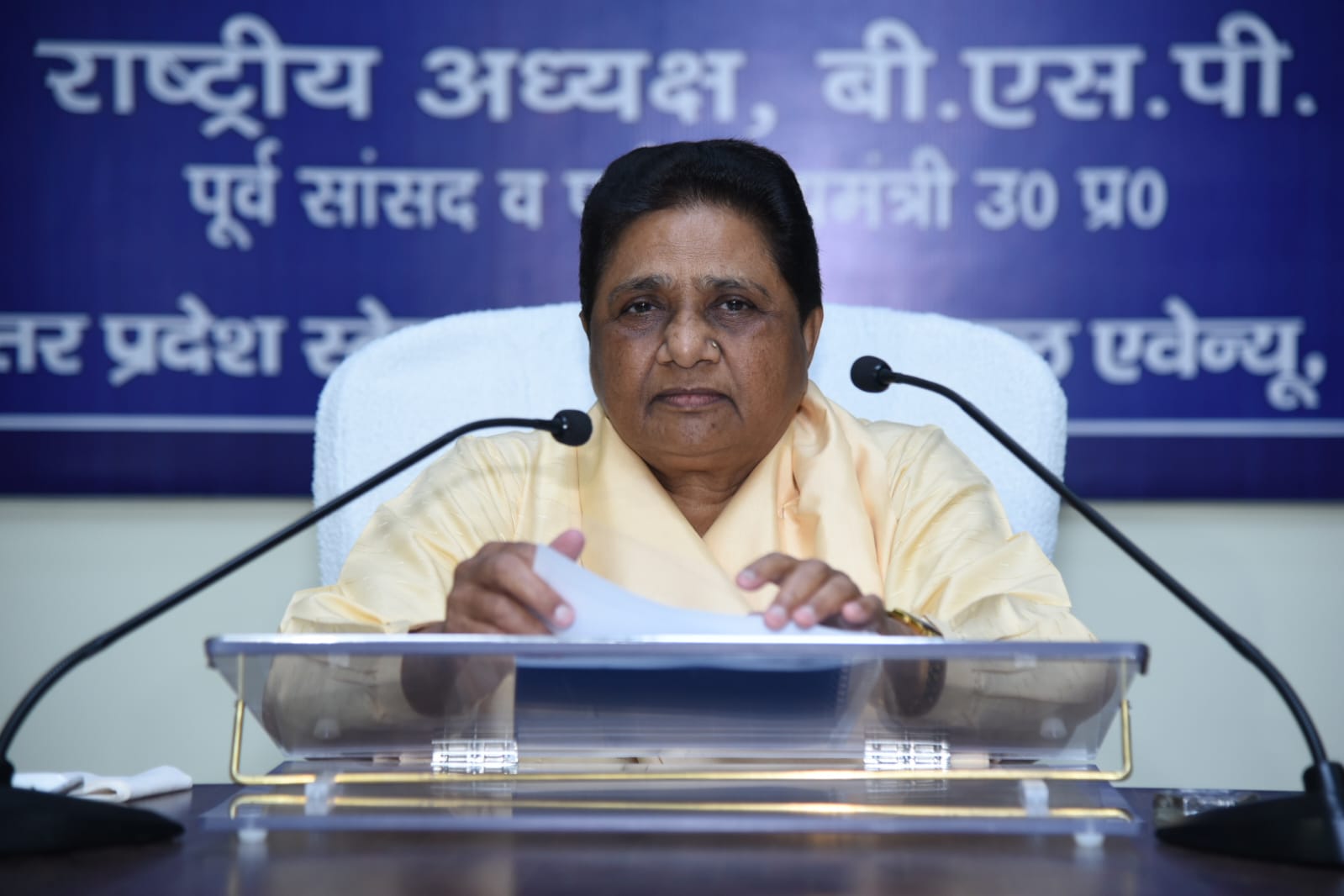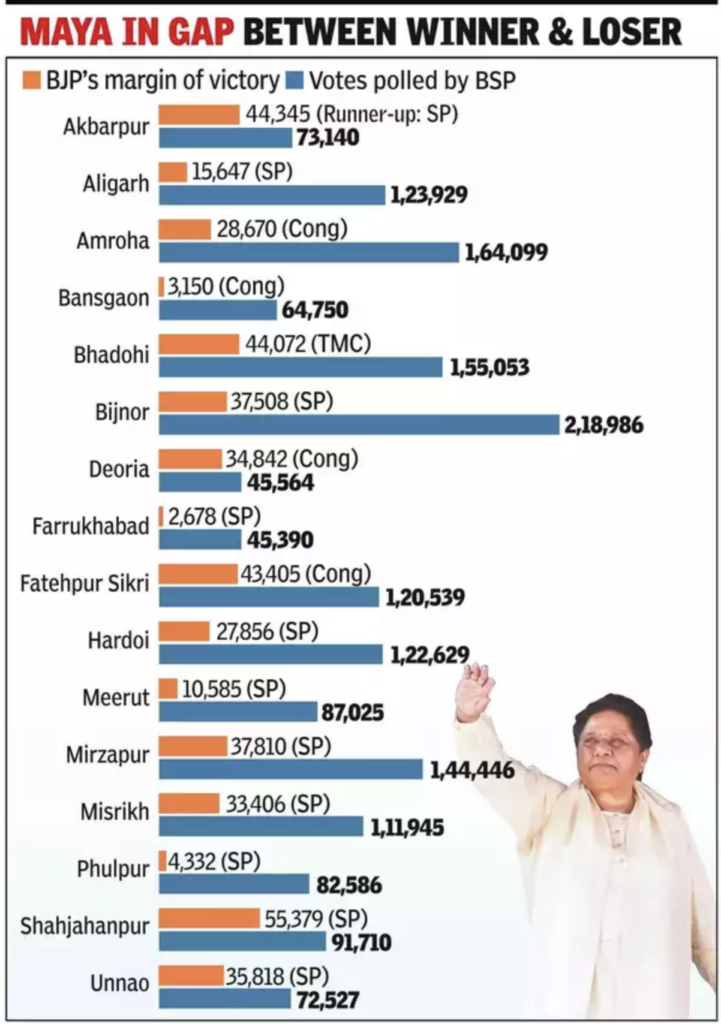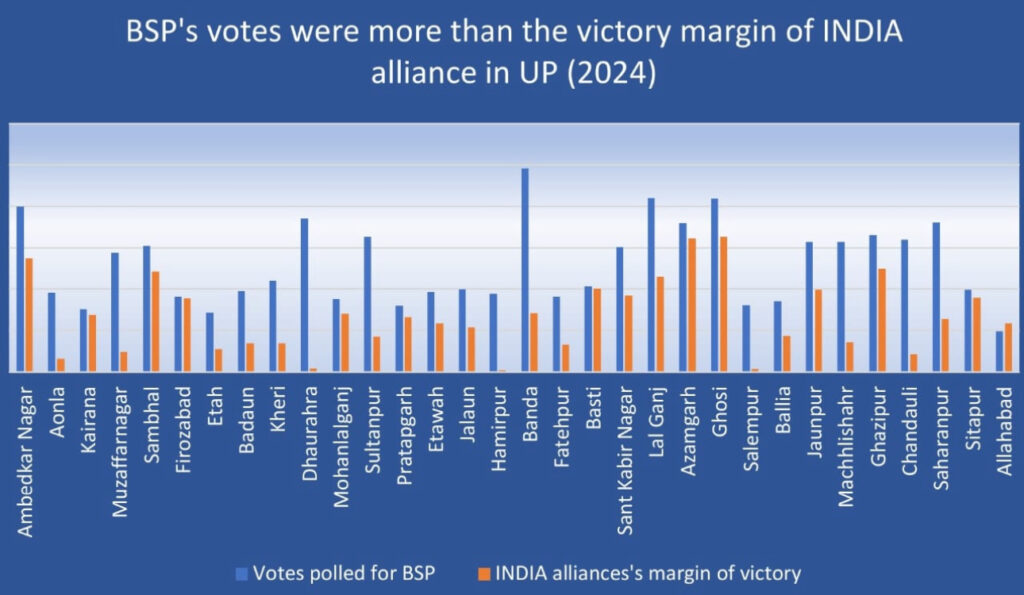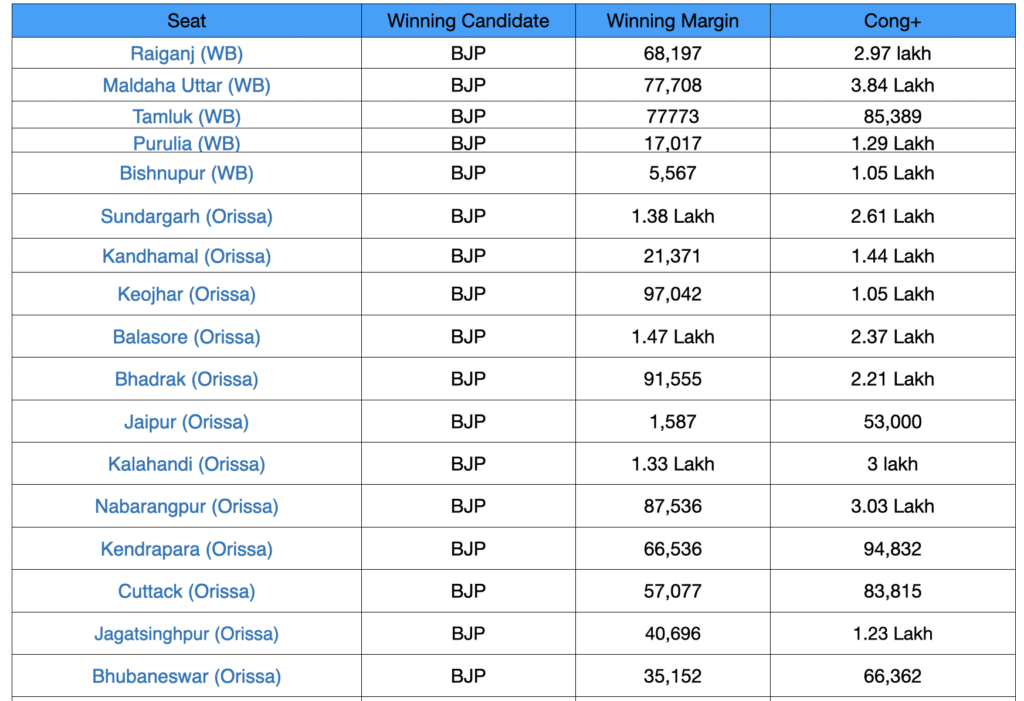
”A lie can travel halfway around the world while the truth is putting on its shoes.“ — Unknown
Bahujan Samaj Party (BSP) has continued to suffer heavy losses: in the 2024 general elections, it lost nearly half of its voters with the vote percentage coming down to 9.3% in Uttar Pradesh as against 19% in 2019. In 2022 assembly elections, it had 13% vote share spread equally across the state. What is worse is that it failed to win a single seat and did not even come second in any of the places.
Strangely, for a party that is so down, the BSP is in the news for a different reason and has been trending since the election results.
Times of India report — BSP “helped” BJP in 16 seats.
It all started with Rena Nagarajan’s report on June 6 in Times of India titled “BSP polls more votes than victory margin in 16 UP seats.” The subtitle was “Dalit parties leave their mark on the elections.” This was subsequently quoted by India Today, The Week and Hindustan Times. Journalists like Rohini Singh and Swati Chaturvedi used the TOI report and tweeted that the BSP helped the Bharatiya Janata Party (BJP) win 16 seats in Uttar Pradesh. Indian National Congress (INC) spokesperson Supriya Srinate and Aam Aadmi Party’s Sanjay Singh also quoted the TOI report to make the same allegations. Even social media influencer Dhruv Rathee called the BSP a culprit.
It was suggested that the BSP had cut into the INC-SP vote share and hence helped the BJP. One YouTube channel went a step further, captioning the video “Did Modi become prime minister because of Mayawati?”
I am reproducing the table given in the Times of India that provided the victory margin of the BJP and the votes polled by BSP.
For instance, in Amroha, Kunwar Danish Ali of Congress lost to the BJP by the margin of 28,000 votes and the BSP candidate Muhajid Ali, who stood third, secured 1.64 lakh votes. In Bijnour Samajwadi Party’s Deepak Saini lost to Rashtriya Lok Dal’s Chandan Chouhan by nearly 37,000 votes whereas the BSP candidate Vijendra Singh came third with 2.18 lakh votes.
Sadly, nobody cared to fact-check and the reasoning followed was fallacious. First, the BSP had 10 Lok Sabha members in the outgoing parliament with Danish Ali wining from Amroha and Malik Nagar winning from Bijour in 2019. In this situation, not expecting the BSP to contest such seats and give a walkaway to INDIA alliance was a laughable proposition. Second, the BSP candidates who impacted the BJP vote base were not considered at all.

Take, for instance, BSP’s Jaat candidate Vijendra Singh in Bijnour who actually reduced the victory margin of RLD’s Chandan Chouhan. In 2019, the BJP had secured 4.91 lakh votes but this time RLD’s Chandan Chaouhan got 4.04 lakh votes. Most of the BSP’s 5.61 lakh votes from 2019 shifted to the SP. Without BSP’s Jaat candidate, it is quite possible that Vijendra Singh would have increased his victory margin.
In politics, we have oftentimes seen that 1+1 does not result in 2. The alliance of the SP and the BSP was way below the BJP vote share in 2019 elections. Hence the assumption that all the votes of the BSP would have gone to the SP-Congress candidates is not true.
Did BSP help SP and Congress in 31 seats?
Alternatively, let’s for a moment concede that it was the BSP candidates who ensured that the BJP and allies were able to secure 16 seats by being a vote-cutter of the INDIA alliance. Then it is imperative to analyse all 80 seats of the BSP and see the data.
Data compiled for all 80 seats shows that there are 31 seats where the INC and SP won in Uttar Pradesh with a victory margin lower than the votes received by the BSP candidate who came in third. For example, in Muzaffarnagar SP’s Harendra Singh Malin defeated BJP candidate by over 24,000 votes with BSP’s OBC candidate Dara Singh Prajapati polling 1.43 lakh votes. In Dhauraha seat SP’s Anand Bhadoria won by defeating BJP by just around 4,449 votes and BSP’s Brahmin candidate Shyam Awasthi received 1.85 lakh votes.
If the theory is used for 16 seats lost by INDIA alliance then the same theory should be applied
where the INDIA alliance won in 31 seats. Thus, going by the logic of the 16 seats lost by SP-Congress, BSP candidates helped defeat BJP in 31 seats and helped INDIA-Congress. Without BSP candidates in the fray, the BJP could have actually won few more seats from these.
Could we then conclude that opposition alliance won these 31 seats due to the help from the BSP? Extending the logic of 16 seat lost by the INDIA bloc, let’s see the data outside of Uttar Pradesh and analyse seats where the BJP victory margin was less than the Congress candidates that came in third.

Congress helped BJP win 17 seats in West Bengal and Odisha
I have compiled data for Odisha and West Bengal seats. In these two states alone, Congress and allies turn out to be BJP’s friend by causing defeat of Trinamool Congress and Biju Janata Dal candidates. The BJP won 17 sets in Odisha and West Bengal where the victory margin was less than Congress candidates’ votes. (Congress came in third; see table below).

In Rajganj, BJP candidate Kartick Paul defeated TMC candidate by a margin of 68,197 votes but the Congress candidate who came in third polled nearly 3 lakh votes, thereby helping the BJP and ensuring the defeat of TMC candidate Kalyani Krishna.
In Maldaha Uttar seat, BJP candidate Khan Murmu won by over 77,000 votes but Congress candidate turned out to be a vote cutter and received 3.84 lakh votes causing defeat of TMC candidate Parson Banerjee. Mamata Banerjee has been calling Congress as B-team of BJP in West Bengal. Could we say that she has been proven right?
Similarly, the BJP was able to open the account in Kerala because Congress candidate who stood third polled more than BJP’s victory margin and causing the defeat of the Communist Party of India (Marxist) candidate.
Congress is squarely focusing on directionless BSP at this time. The campaign that the BSP is the ‘B-team of BJP’ has been run earlier also, though on numerous occasions (including post 2014), the BSP had bailed out minority Congress governments like Harish Rawat in Uttarakhand, Kamal Nath in Madhya Pradesh and Ashok Gehlot in Rajasthan, even enabling Cong-JDS-BSP govt in Karnataka.
Despite its success in UP and Maharashtra, INDIA alliance could not defeat Modi in 2024 due to Congress party’s disastrous performance in Madhya Pradesh, Delhi, Himachal Pradesh, Andhra Pradesh and Uttarakhand (all the states where it drew blank) and won only one seat each in Gujarat, Odisha, Chhattisgarh, etc.
Instead of sending a thank you card to the BSP for the way it ran the campaign and indirectly helped INDIA alliance in UP, INDIA alliance and its supporters seem to be blaming the BSP for its loss in UP with partial data.
